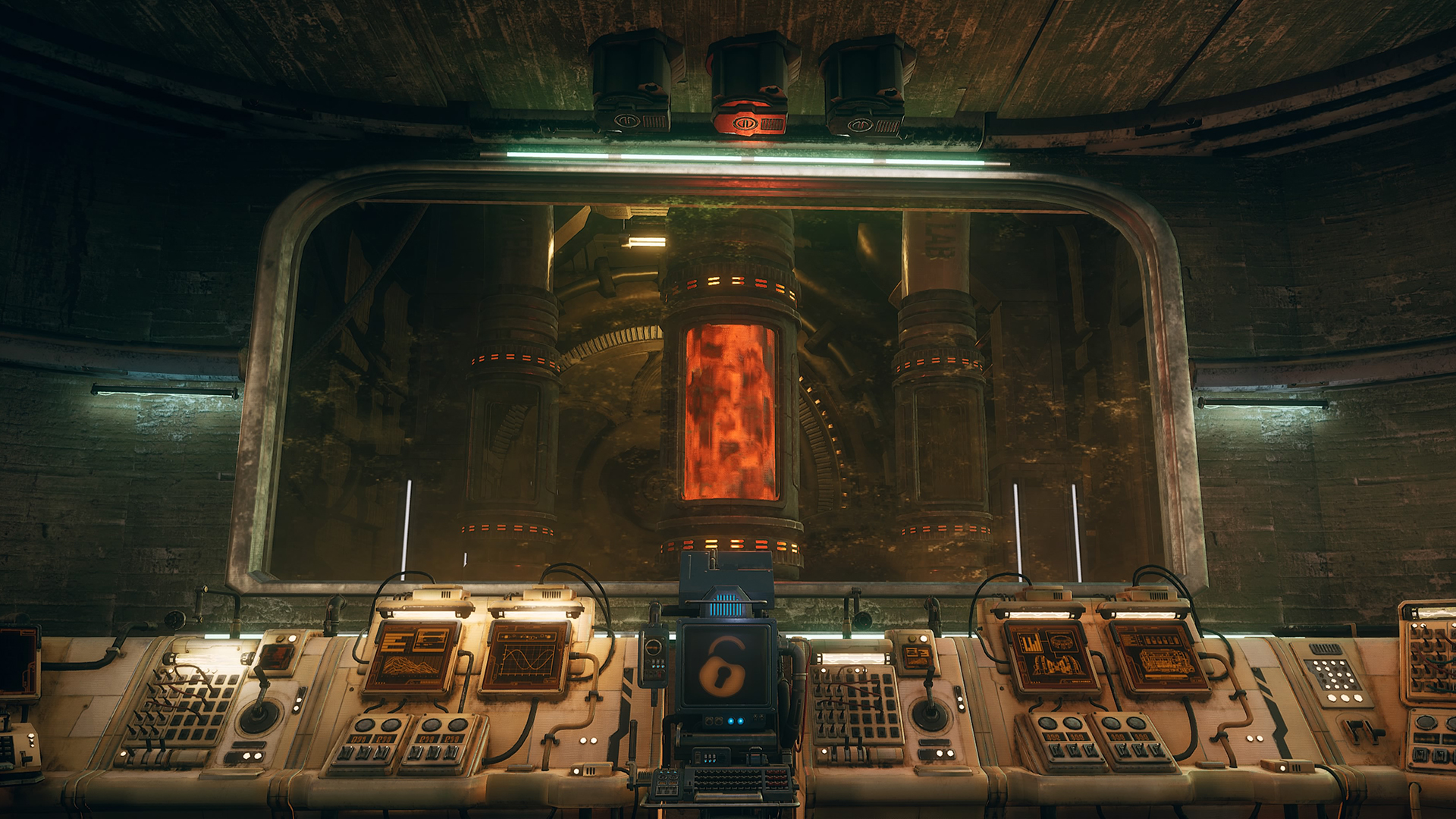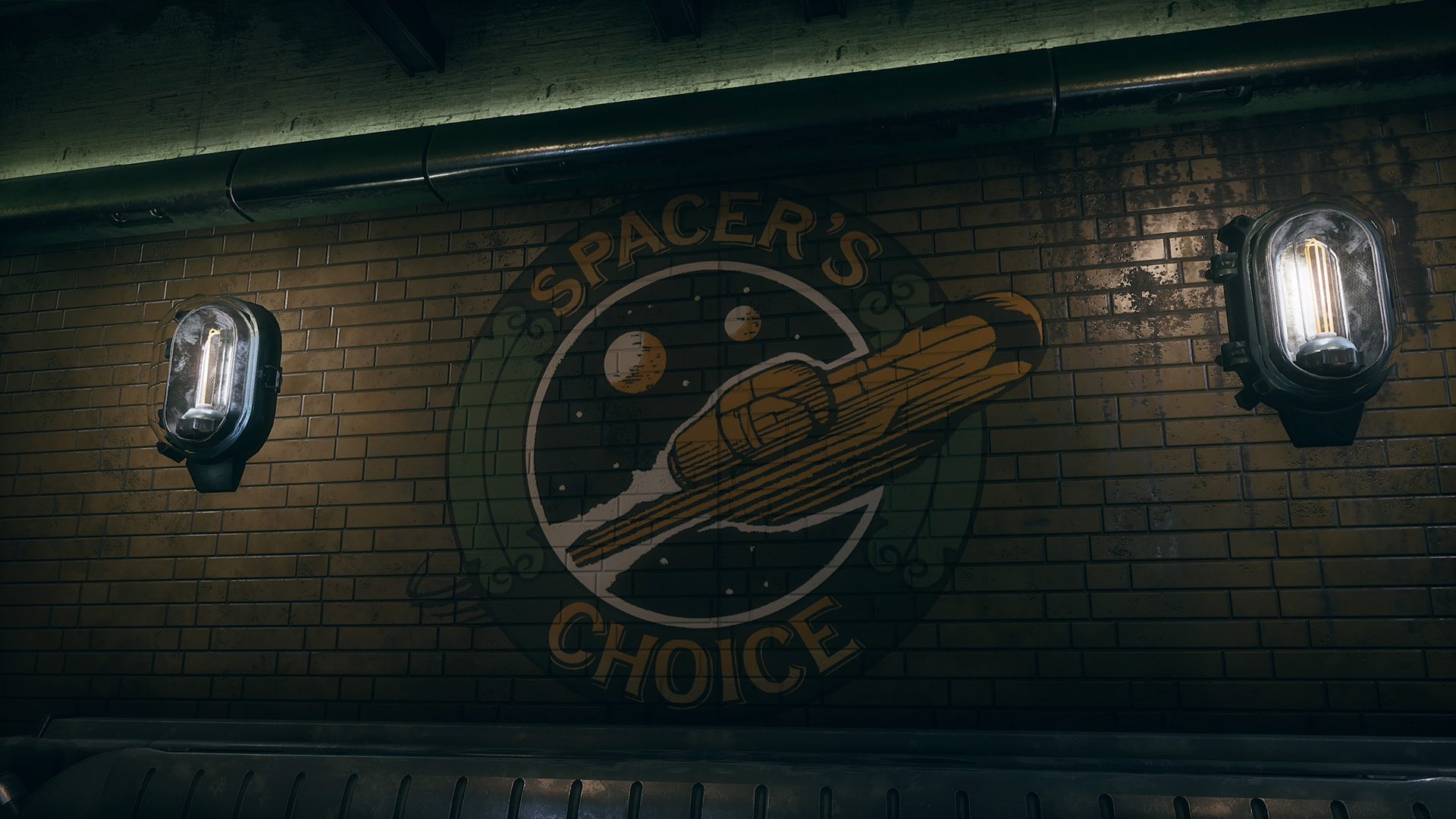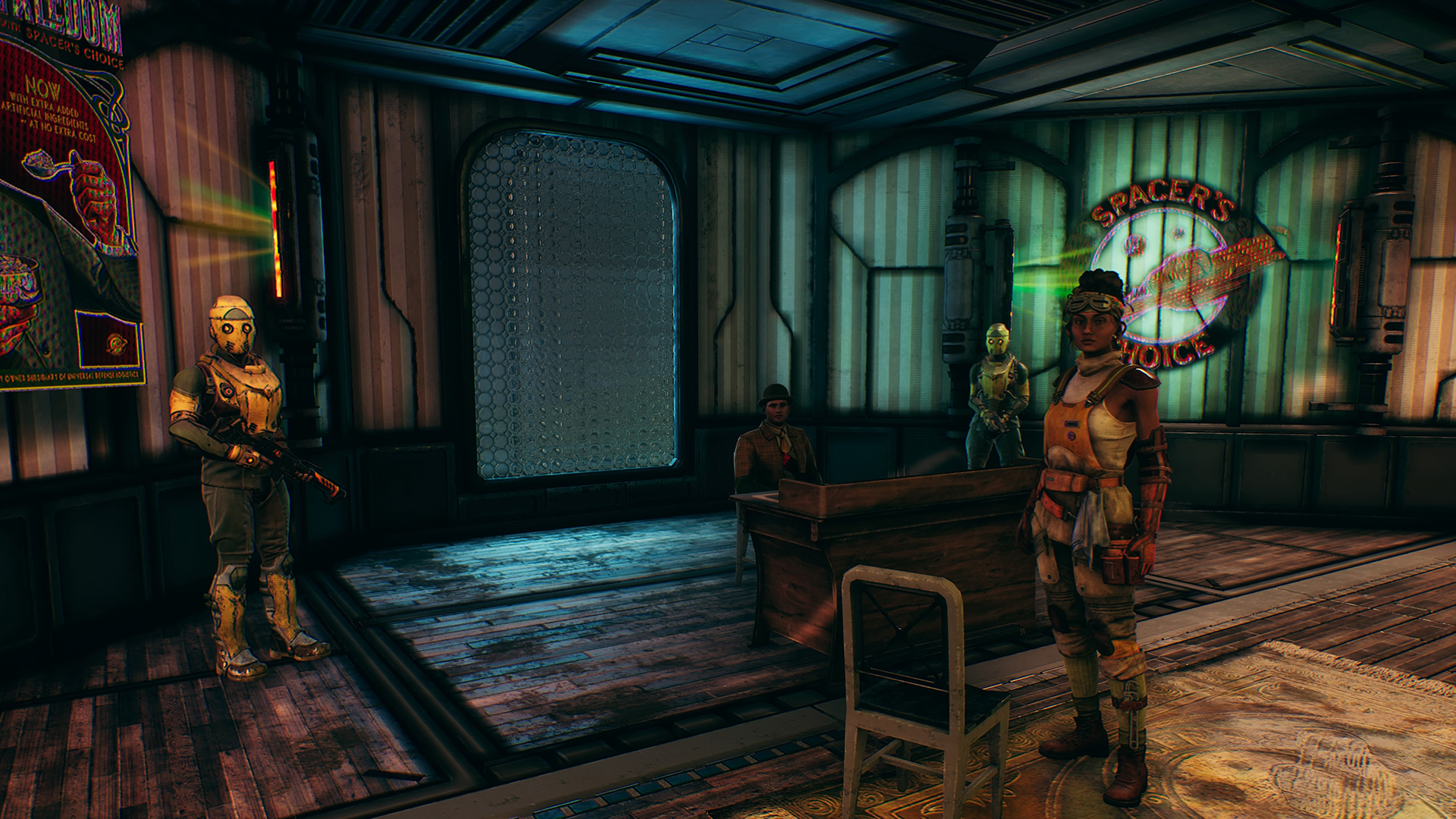I’m a little over four hours into my first playthrough of The Outer Worlds before my conscience starts to tug at me. At this point, I’ve completed all but one of the sidequests in the starting town, and my character has been perfectly shaped into the sarcastic-yet-charming space rogue that I set out to roleplay as. He’s quick to help people (provided they can pay up) and he’s one hell of a hacker and thief, more than eager to get into places he’s not allowed. The game’s dialogue options—always one of developer Obsidian Entertainment’s biggest strengths—help me keep my character neatly within the confines of the Chaotic Neutral alignment I assigned him.
I’ve helped local law enforcement by killing their bounties, slaughtered some marauders on my way to track down a missing person, unleashed my inner loan shark by shaking down residents late on their own burial plot payments, and even stolen antibiotics to aid the town’s community. I did a lot of good by willing to do some bad things. Morality hasn’t been an issue for me or my character yet. But as the main quest for the beginning area is coming to an end, I’m faced with a difficult this-or-that decision that’s going to doom an entire community while helping another. To keep specific spoilers to a minimum, I’ll just say that I need to decide which group will get life-sustaining electricity and which group will be shut off the grid forever. My companion expresses her hesitancy and asks me if I fully understand what I’m about to do before trying to get me to see it from her angle. There’s no right or wrong option, which makes the choice that much harder. Now, I think, the game is finally going to give me my first taste of its tough moral dilemmas.

I consider the differences I’ve seen so far between the two communities, and how the happiness of their population seems to vary. Neither can afford the loss, but who has the most to gain? I agonize for a couple minutes before I finally make my choice. Afterwards, I visit the town that I saved and talk to the person in charge, who’s delighted with my actions. Earlier in the quest they assured me that citizens of the other community would find a home there, and I ask to see if that’s still the case. That’s when the true result of my decision is made apparent: Only those who denounce their previous lives will be welcomed in.
When I go back to the community I doomed, I come face to face with the aftermath of my decision. Guards are ordered to shoot me on sight if I try to snag the part I need for my ship. Citizens gather together in a mob, frightened and worried about what the future is going to hold for them now. I didn’t just rob this place of electricity; I robbed it of its life. I had spent hours helping these people only to end up destroying them. It‘s a moment that should make me feel something—an ounce of guilt, a pang of remorse—but functionally, the game doesn’t seem to care about what I did.

I can freely go where I want, I’m still able to turn in my remaining bounties, and I’m able to talk my way into having the guards stand down. Even one of the potential recruitable companions, who I assumed would refuse to join me after what I did, doesn’t have much to say on the matter. Things are bad for the people who live there, but, for me, there are no true gameplay consequences, either in terms of what’s available to me or how I interact with the world. So what was the point of making this choice and getting such a gut-punch twist if it didn’t actually matter? I had assumed there wasn’t a right or wrong option because I was supposed to be punished no matter what, but it feels more like there wasn’t a right or wrong option because I wasn’t actually supposed to be punished at all.
After finishing the quest, it’s impossible for me to not remember Fallout 3 and its town of Megaton, which houses an undetonated atomic bomb in its center. Early on in the game, you’re confronted with a choice to either disarm the bomb or detonate it. You as a player know it’s an evil option, and if you choose to do it, the game’s karma system punishes you drastically because it knows as well. This can cause the player to obtain the lowest level of karma possible in an instant, only a few hours into the game, and reduced karma has a direct impact on gameplay, locking you out of certain companions and making you a target to dangerous vigilantes. There’s no true reason to commit such a senseless act of heinous violence but, despite this, you’re still allowed to.
By presenting a situation in which there is a definitive evil option, Fallout 3 lets you know how your moral compass should be aligned as you play the game. You already understand as a player what’s good and bad, but you also understand that within the context of the game’s world. There are moral boundaries set in place and some actions won’t (and shouldn’t) be forgiven by the game and its NPCs. Still, you’re free to choose to be evil so long as you’ll suffer the consequences. There’s genuine weight behind your choices, and that gives them more impact regardless if you choose to be good, bad, or somewhere in between. No matter what you do, it’s going to have an effect.
The Outer Worlds doesn’t have a karma system quite the same way that Fallout 3 does, but it does have a reputation system that’s determined by how you’re viewed by factions. Because of the heavy role factions play, The Outer Worlds does offer options that are the lesser of two evils by trying to unite factions. I suppose you can make the argument that these options are the ones that are concretely good.

If you put in the work to achieve it, there’s a third choice available to the aforementioned quest that’s able to get the two communities to compromise by having one leader take over for the other; the success of this outcome, however, is debatable. Fewer people might be at immediate risk of dying, but it’s hard to tell, ethically speaking, if you did the right thing. In a failing town brainwashed by capitalism, where a citizen’s suicide is only a cause for concern because it technically vandalized company property, does sending them back to their old way of life with a clearly vindictive new leader really save them?
I’ve focused on a single early example, but this level of uncertainty persists throughout The Outer Worlds, furthering my frustration with the game. It would be nice to know for certain that one of my choices has an outcome with clear repercussions, positive or negative. The citizens should view me differently based on what I chose, and that should lead to either consequences or benefits. Outcomes only leave me with questions that go unanswered, and that feels less like an exploration of gray morality and more like unsatisfying writing. The only truly noticeable thing I can tell is affected by my reputation is the buying and selling cost at vendors. And while it is possible to get people to attack you based on your reputation, I’ve yet to have this be an issue because of quest choices. Instead, it seems such a significant drop in reputation is caused by getting caught committing crimes or straight up murder.

The choices in the game that try to find some sort of common ground between factions—especially later ones that I’ve seen—very much operate under the idea that you can’t make an omelette without breaking a few eggs. Either someone or something is bound to get caught in the crossfire of your actions, and that’s true for real life as well. It’s just that when this does happen in the game, it doesn’t have much effect.
I don’t think every single choice in the game needs to be so clear or wrap up so neatly, but I think the game would really benefit from some that do. In life, some things aren’t up for moral debate. Sometimes things are inexcusably bad, and sometimes things are unarguably good. Gray areas don’t always exist for every situation. Showcasing that doesn’t make for uninteresting writing; in fact, it only helps to strengthen the focus on moral ambiguity. When you have an understanding of the limits of morality in the game, then being confronted with a situation in which there is no clear right or wrong answer makes deciding what to do more purposeful. You know there’s no easy answer this time, and that in turn makes your morality feel truly tested because you’re unsure if you’re actually doing the best thing.
I really do admire Obsidian for wanting to put the player in tough situations that require them to make equally tough decisions. The problem is that the decisions aren’t so tough to make once you realize nothing is really at risk. By shying away from giving a glimpse into a moral binary, The Outer Worlds ensures that your gray morality isn’t really all that gray. How can it be, if there isn’t any black and white?
Header image credit: Private Division, Obsidian Entertainment via EGM

Nick Ransbottom is a freelance journalist and former reviews editor for RPGFan. When he’s not making bad puns on Twitter, he’s most likely either putting a few more hundred hours into Monster Hunter: World and Overwatch, or impressing almost no one with his knowledge of Kingdom Hearts lore.
